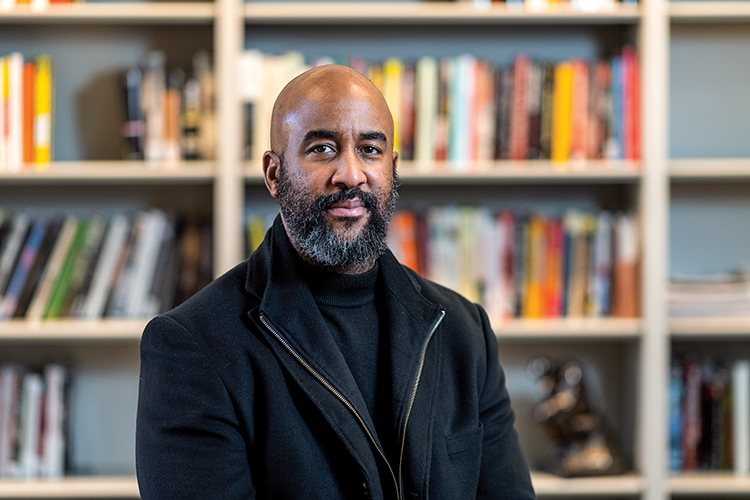The day Derrick Darby ’88 meets Martin Luther King Jr., he’ll shake his hand and ask him about his inspirations. What moved him to do his intellectual and activism work?
In this imaginary time, Darby will also meet other forces in black political thought, like W.E.B. Du Bois, Marcus Garvey, Angela Davis, Imari Obadele, and Claudia Jones. “These are all great people who have also struggled in all kinds of ways, and learning something about what moves them to do the things they’re passionate about and how they’ve managed it would be valuable for me in my own journey,” Darby says.
The first black tenured philosophy professor at the University of Michigan, Darby has had his share of struggles both in his personal and professional lives. A child of the Queensbridge housing projects that birthed famed rappers like Nas and Havoc, Darby had a difficult upbringing. Earning a scholarship to Colgate, he found his beloved discipline, but he also quickly realized there weren’t many people of color pursuing philosophy. “I had a pretty rough journey through it all, partly because there were so few of us, and I’ve been in so many spaces where I’m the only one,” he says. So why, then, did he persevere?
Like many alumni, he was inspired by Professor Jerry Balmuth. The Colgate luminary taught Darby the basics of philosophy and pushed him to pursue graduate school. Balmuth told Darby, “philosophy needs you,” and Darby cared for Balmuth so much that he continued to study the likes of Plato, Kant, and Nietzsche. Eventually, Darby moved on to the philosophies of Du Bois, Garvey, and others. Finally, his two worlds — those of philosophy and the black experience — collided.
With his colleague, political science professor Christian Davenport, Darby is connecting those experiences. Together they’re researching the political philosophies of MLK, Du Bois, Garvey, Davis, Obadele, and Jones. “We’re trying to highlight what previous thinkers coming out of the African American tradition have thought about the crisis of democracy in America during the times in which they wrote,” he says. That involves extracting excerpts from their speeches and writings to get a sense of their thoughts on a range of political issues, from economic justice to discrimination. Once that information is collected, the professors will create a map of the “political marketplace,” which identifies options for political decisions. For example, if you’re fond of MLK, you might look to how he viewed an issue to decide your own stance. The research will appear in an upcoming book aimed at a contemporary audience; Darby hopes it will be an accessible way for people to form their political ideologies.
Darby is also using this research to teach a Black Political Thought course, in which students look at how people of color have historically been treated in America. Students then examine how those experiences line up with ideals like equality, freedom, and justice. “The course basically takes six figures, and it tries to track their assessment of the problem, their conception of the utopia, and their account of how we get from the reality to the utopia,” Darby says.
Darby has become close to these six figures, and he’ll keep them near as he moves onto his next position: Rutgers University professor of philosophy and director of the Rutgers Summer Institute for Diversity in Philosophy. The institute shows undergraduates what it means to be a professional philosopher and gives them an introduction about philosophy PhD programs — information Darby received from Balmuth. He wants to make sure students, like the young Darby, know they have the option to pursue a career in philosophy.
Philosophy needs them.

